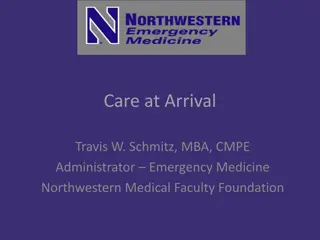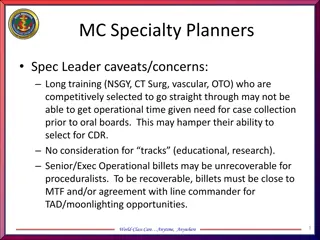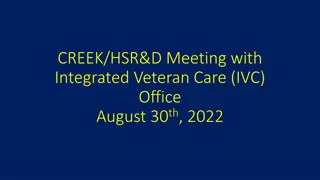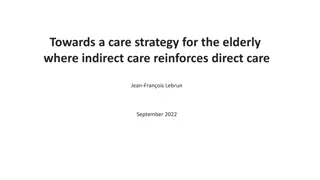Insights from Operational Research on Care Groups
Key findings and recommendations from operational research on care groups conducted by Dana Corbett in October 2019. The research explored various topics such as roles of volunteers and promoters, barriers to meeting responsibilities, motivators for participation, ideal meeting times, and more. Insights were gathered from informants through focus group discussions, highlighting challenges and areas of success in care group initiatives.
Download Presentation

Please find below an Image/Link to download the presentation.
The content on the website is provided AS IS for your information and personal use only. It may not be sold, licensed, or shared on other websites without obtaining consent from the author.If you encounter any issues during the download, it is possible that the publisher has removed the file from their server.
You are allowed to download the files provided on this website for personal or commercial use, subject to the condition that they are used lawfully. All files are the property of their respective owners.
The content on the website is provided AS IS for your information and personal use only. It may not be sold, licensed, or shared on other websites without obtaining consent from the author.
E N D
Presentation Transcript
Operational Research on Care Groups KEY FINDINGS & RECOMMENDATIONS DANA CORBETT OCTOBER 2019
Topics Explored Perceived roles and responsibilities of Care Group Volunteers and Promoters Barriers to meeting responsibilities Things that motivate and discourage participation Ideal meeting times Time commitments Topics of Care Group lessons Perceptions of the quality of trainings by facilitators Current state of Care Group and Neighbor Group lessons Current state of home visits Male involvement Experiences with data collection and management Things that are going well and things that are challenging Requests for incentives
Informants Care Group Volunteers (CGVs) Promoters Neighbor Women (NW) * All from Matongo Data collected through focus group discussions
Perceived Roles and Responsibilities Promoters and CGVs clearly understood their roles as peer educators As a promoter I was chosen and educated, after that I handed the knowledge down to the care group leaders and CGVs who also hand it down to the women in neighbor group. Thereafter I follow up to know if the knowledge was passed down to them. Promoter Some individuals specifically mentioned their duty to serve as role models Us as leaders, we're supposed to be good role models, you know you can't tell someone to observe good hygiene yet you do not practice that, she will rather ask you how has it helped you and you'll lack words to respond. Care Group Volunteer
Barriers to Meeting Responsibilities Some CGVs struggle to complete the Neighbor Group registers due to lack of writing utensils Sometimes women cannot attend meetings because they have to care for children or a sick family member Promoters and CGVs sometimes struggle to complete their home visits because women are not available when they arrive: Women get into conflicts with husbands and temporarily leave the house Women get distracted with their chores Women often want incentives to participate in home visits When you make an appointment to meet [Neighbor Women], they tell you that they will waste their time, they want sitting allowance, which if they were to be working for someone, they could have gotten something. Care Group Volunteer
What motivates NW, CGVs, and Promoters to participate? Watching KIKOP bring the community together Being able to learn about health behaviors in communities and health facility usage Watching Neighbor Women (NW) enjoy games and concentrate on lessons Facilitators enjoy not only teaching, but also learning from the lessons themselves NW specifically enjoy learning how to care for their children and playing games at lessons You feel proud of yourself, when what you have taught them, they understand and put to practice what they have learnt. - Care Group Volunteer
What discourages NW, CGVs, and Promoters from participating? Promoters feel discouraged when they have poor attendance at meetings. Absenteeism often due to bad weather and women having conflicts with husbands Absenteeism was demotivating for NW as well. Sometimes, facilitators do not show up for Neighbor Group meetings A time we go to the agreed place for our meeting, however we get that our teacher is not there, we spend there, we spend there a little longer, leaving the place at 3:00 pm or at 4:00pm. This affect our morale, if we never keep time. Neighbor Woman
Ideal Meeting Times Wednesday was most frequently cited as a preferred day for meetings Monday and Thursday were rarely cited as convenient days for meetings due to the local market being held on both of these days and funerals being held on Thursdays. Weekends are not usually convenient because many people attend church on weekends. Afternoon meetings were twice as often preferred over morning meetings because that allows them to complete chores and prepare lunch for their families before going to the meeting. Meeting days and times were typically decided within the Care Groups and Neighbor Groups based on each member s availability.
Time Commitment Care Group and Neighbor Group meetings should only be 1 hour to keep attendance high and make sure women don t get bored Are usually much longer than this because women show up late Lots of variety in preferred frequency of meetings Varied from 2 or 3 meetings per week to 1 meeting per month Number of home visits per week (by CGVs and Promoters) varied from 1-5 Home visits typically 30-45 minutes Workload for Promoters is increasing because fewer CGVs are attending group meetings
Topics of Care Group Lessons Sanitation and hygiene. This included both personal hygiene and home hygiene. Sexually transmitted diseases. Including syphilis, gonorrhea, HIV and PMTCT, and how to prevent these diseases. Infectious and emerging diseases. Although they did not give specific examples of specific diseases (other than the STDs listed above), they in general were interested in learning about how to prevent diseases and how they "attack" a person. Family planning. Food storage. How to prepare and store baby's food so it doesn't go bad. First Aid. One woman specifically mentioned wanting to learn the Heimlich Maneuver Child nutrition. Specifically, this woman requested information about what to feed her child(ren). This person recognized that they have already had nutrition lessons, but she would like to know more.
Perceptions about the Quality of Trainings Promoters, CGVs, and NW were all feel comfortable asking questions and think that their facilitators are well-informed However, Promoters didn t seem to think that CGVs were prepared to teach Often Promoters have to teach lessons for CGVs because they do not feel ready to teach If I was to rate the promoters, I would say they scored 100%. Because they are friendly and joyful, when they come for classes they are kind and conduct the games in a friendly manner. Neighbor Woman We also accompany the CGVs to the care groups after we have taught them Promoter When we were choosing [the Care Group Volunteers] they did not know that they were going to be teaching other women There are others who do not know how to read even if they were chosen for that role. They were not aware that they were going to deal with any writings so when we take these forms for them to teach there are some who are afraid. You can teach them but when they get to the neighbor women as you listen to them teach you can see that they did not understand what you taught them. So you have to accompany them and help them teach the neighbor women as well. Promoter
Current State of Care Groups and Neighbor Groups There are those living around us, and sometime around the place where we sit when we have our meeting, curious people who want to know what is happening there also come and you cannot send them away. Neighbor Woman Lessons occur twice each month and last 1-2 hours NW choose where meetings will be held often a NW s home Promoters often come to Neighbor Group lessons CHVs and TBAs may also attend Other women who are not part of the Neighbor Group may attend out of curiosity CGVs may invite other CGVs to attend Care Group meetings in case they need help teaching something CGVs reported having 8-12 active NW in their Neighbor Groups The materials they use to teach are the flip charts and lesson plans prepared by KIKOP Lesson plans need to include lots of pictures and demonstrations because many mothers are illiterate Mothers love the games! You ll find sometimes a woman was beaten in the night. She comes to the Care Group and she is sad. When she starts playing games, now she feels good. Promoter
Current State of Home Visits NW typically really enjoyed home visits Visited twice/month Husbands are encouraged to participate CGV checks on health of baby or pregnant woman, goes over lesson, checks health behaviors, & fills out NG register Usually last 30-45 minutes There were mixed responses about what happens when CGVs miss meetings: Normally the promoter makes a phone call. If the promoter cannot get access to you, then he/she will visit you the following day. At times, the promoter gives the material to someone to bring to you. As for me, I look for the promoter to get the lessons if I happen to miss a lesson. They are so hardworking and determined, like my promoter pays visit to my home whenever I miss any care group meeting. Care Group Volunteers
Male Involvement There was an overall desire for males to be more invested in the trainings and the project. [Care Group Volunteers] usually tell them they have brought them something new to learn. They can also inquire if the husband is there, if he is in they can request them to come and learn together. Promoter When we are meeting we would want our husbands to be encouraged to attend so as to bring some warmth. Neighbor Woman Men sometimes made it difficult for CGVs and NW to participate. Women often have to ask permission to attend meetings, and men sometimes discourage participation since women are not paid for their role. Facilitator: So do you seek permission from your husband in order to attend CGs meeting? Care Group Volunteer: Sure! You cannot just walk out of your house like that. There is a problem is the CGVs, we started working well with them but along the way they started saying their husbands are asking them since they left in the morning there is nothing they are bringing back home.. So it is like their working spirit is deteriorating. Promoter
Collecting and Managing Project Data Promoters think some observational questions are too invasive All five Promoters agreed that they have a hard time obtaining Promoter summary sheets If CGVs do not attend Care Group meetings then Promoters have a hard time getting the Neighbor Group register. Once they obtain them, information is often missing so Promoters have to call CHVs to get data The summary sheets is kind of challenging to me because of the CGVs Sometimes it is hard since when we ask them what happened it is like you are troubling them They forget to ask things like pregnancies and miscarriages. So when they do not know about those I am forced to call the [Community Health Volunteer] to ask about the number of pregnancies or miscarriages in the area of that particular CGV since the CHV usually has a record. Promoter CGVs could use a refresher training on data management One CGV reported never having a register: As for my sake, I do not have a register; I have never received nor seen one. By the way, I have claimed long time but I have never received it. Care Group Volunteer When asked about what happens when CGVs do not attend a meeting called by a promoter, one CGV said: You guess the outcomes and fill them in the registers. Care Group Volunteer
Successes with the Training Cascade Community-wide support of the project women, TBAs, CHVs Building a community-wide interest in health Good relationships between project staff and the community We love how the promoter understands us and teaches us in the way we prefer they are happy to be teaching us. Neighbor Woman CGVs are conducting comprehensive home visits Women are learning a lot from the lessons Eager to learn and ask lots of questions, enjoy the games and pay attention We see changes in our communities, women mind about sanitation and hygiene, about the health of their babies, how to make a baby's food and going to seek hospital services. - Care Group Volunteer
Challenges with the Training Cascade Time waste When CGVs do not show up for Neighbor Group meetings When CGVs or NW arrive late to lessons When CGVs or NW are not available to meet for home visits Volunteers want incentives for their participation CGVs and NW think that KIKOP staff and Promoters are stealing from them and keeping incentives for themselves Creates distrust between members of the cascade Reaching all women through home visits If she keeps visiting others and I am never visited, I normally assume that our leader despises me or maybe there is something she does not like about my home. Neighbor Woman Promoters have a hard time obtaining the Neighbor Group registers they need to fill out Promoter summary sheets CGVs do not feel comfortable teaching, so Promoters are working extra As a promoter, the challenge I encounter is there are some CGVs no longer want to teach [ ] They were not aware that they were going to deal with any writings so when we take these forms for them to teach there are some who are afraid [ ] As you listen to them teach you can see that they did not understand what you taught them. So you have to accompany them and help them teach the neighbor women as well. Promoter
Requests for Incentives Women are sacrificing potential earnings by volunteering their time. CGVs have a hard time maintaining participation because husbands expect the women to bring home money for their work. Other local organizations ( Cure Kenya ) give incentives for participation, so KIKOP volunteers think they are being taken advantage of Mothers would rather skip the meetings and receive the lesson through a home visit than volunteer their time to go the the group meeting As others have said, giving us something really encourages us. Others say that our trainers are paid while they do not give us anything. Others say that, we only go there to waste our time without something in return. Just like that, lessons are normal, will always get those lessons in some other forums it is better; we remain here at our homes. Neighbor Woman Examples of non-monetary incentives: KIKOP-branded items, tea or snacks, milk, bread, diapers, soap, water, basins, water treatment tablets
Key Takeaways Poor attendance is demotivating, wastes time, and creates more work for everyone Home visits (after a CGV or NW misses a lesson) might not always be happening when they should. Promoters have a difficult time filling out Promoter summary sheets. Volunteers would like incentives for participation. CGVs are not adequately prepared to teach lessons to NW. Promoters often have to accompany them and this doubles their workload. Teaching materials need to be simplified as much as possible while still conveying key health information. Men often discourage women from participating since they don t get paid.























